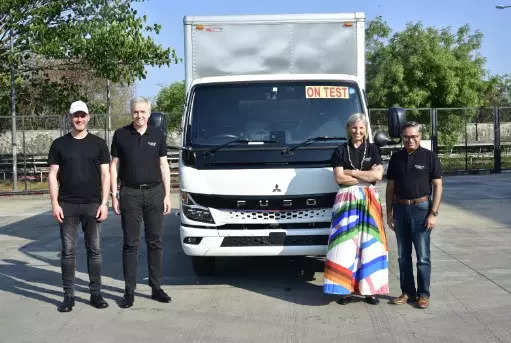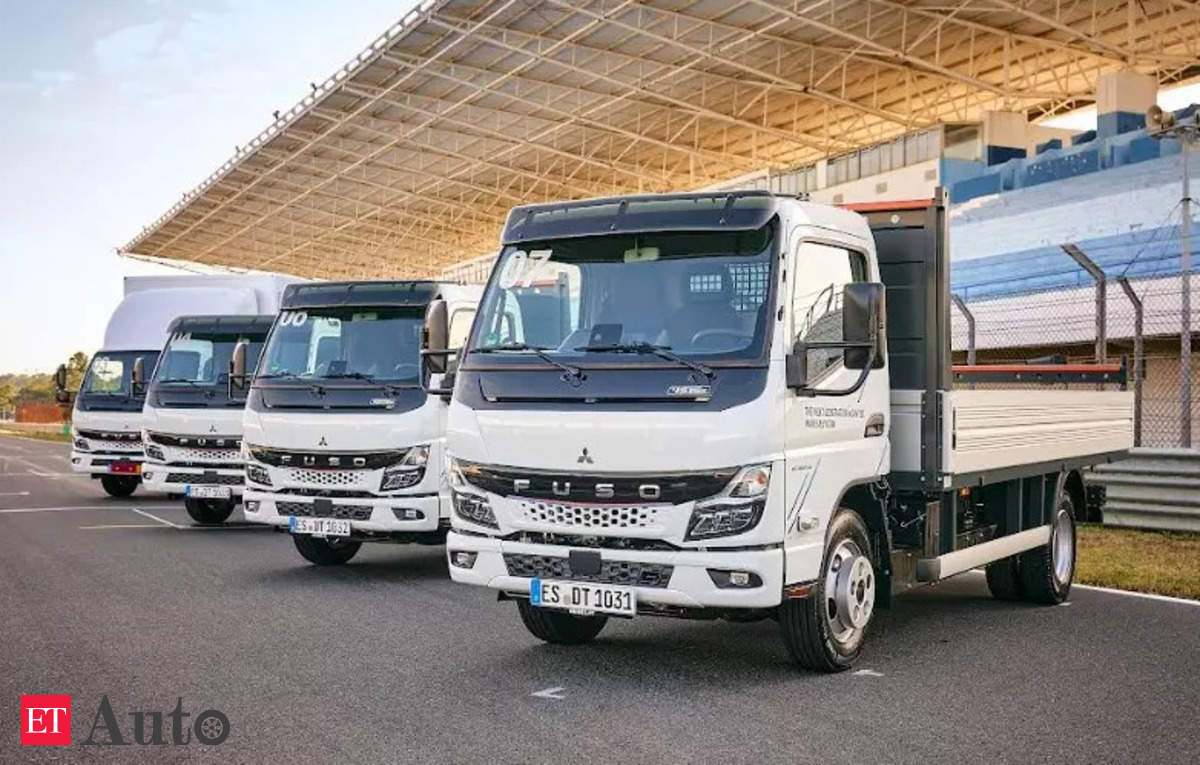Chennai: Daimler India Commercial Vehicles (DICV) is set to be the next player in the emerging electric truck market, with the eCanter, an electric light duty truck from Mitsubishi Fuso, also owned by Daimler Truck. The e-truck, which will also mark DICV’s foray into India’s Light Commercial Vehicle (LCV) segment, will be launched in the market within the next 6 to 12 months.
The eCanter will be assembled in India, and sold under the BharatBenz brand. The e-truck is powered by an LFP battery pack, which can also be charged with an AC charger, and has variants in the 3.5 ton to 7.5 ton GVW range. The launch of the eCanter “is the first step in our long-term strategy to decarbonise our entire product portfolio,” Satyakam Arya, DICV’s MD & CEO said.
The eCanter, currently in its 3rd generation launched last year in Japan, has sold 2,500 units since the debut of the model’s first generation in 2017. The eCanter for India is undergoing advanced trials at DICV, before it goes for trials with prospective customers. The eCanter ‘has sold in hundreds’ in Europe, Australia, New Zealand and Hong Kong. Taiwan, Turkey, and the Middle East are soon to be added as markets for the e-truck. Daimler Truck plans to have a ‘significant presence in major markets around the world with a hundred variants’.
DICV says India’s CO2-neutral propulsion technology market is still in its infancy and therefore has tremendous scope in the long term. And, in the long term, Daimler Truck sees only Battery Electric Vehicle (BEV) and Hydrogen (Fuel Cell and ICE) as the major technologies in the global trucking industry. There’ll be a technology transition in the diesel-dominated truck market in India too, but it is expected to happen gradually.
At DICV, diesel is being seen as having a majority share in the domestic trucking industry till 2047, the target year for India to be energy independent. Currently, 96% of India’s trucks run on diesel, with CNG powering the rest, and BEVs have a negligible share. DICV sees BEVs best suited for the intra-city and regional distribution truck segment, where the daily mileage clocked is around 600 km.
The company’s CO2-neutral propulsion technology roadmap is being prepared in line with Daimler Truck’s global technology strategy with battery electric and hydrogen-based drive technologies. DICV has already developed a BharatBenz hydrogen fuel cell concept coach in collaboration with Reliance Industries. In the future, DICV says it will introduce trucks across different utility segments that will serve long haul, mining, construction, POL, dumper, RMC and others for various freight and terrain requirements.

LNG, a ‘tactical’ play
After CNG, CV OEMs are offering LNG trucks too, but DICV may have only a ‘tactical play’ in this segment. “We will primarily commit to battery-electric and hydrogen-based propulsion technologies across our future product portfolio, in a phased manner. One thing is for sure that we will be ready with the right vehicles where the market is,” Arya said.
Dr. Andreas Gorbach, Member of Board of Management, and Head of Global Truck Technology, Daimler Truck, said that the global major has deliberately bypassed gaseous fuels under its ‘Power to Drive’ technology strategy because “it doesn’t contribute to decarbonisation”. “Yes, there’s less carbon in the fuel, but the fuel efficiency is also less,” he said. “But it merits investing in building the requisite infrastructure for EVs and Hydrogen, rather than for interim solutions like CNG or LNG,” he added.
DICV’s tactical play for LNG could include collaboration with a partner. “We will bring an LNG solution to the market if we see infrastructure developing, and customers asking for it,” Arya said.
India, a major base for Daimler
For Daimler Truck, India is a growing market where it clocked a 39% YoY growth in truck and bus sales, and a 21% growth in revenue last year. It’s still not reached a podium position in the Indian CV industry, but India is already a major engineering and technology development base for Daimler Truck.
Daimler Truck Innovation Center India, the CV major’s global technical centre, is supporting the softwarisation of products across Daimler-owned brands. A major project is the first Daimler OS (Operating System). The OS is expected to be implemented in Daimler’s trucks by the end of this decade, or the beginning of the next decade, Dr. Gorbach said.
At DICV, around 200 out of the 500+ engineers are dedicated for the Mitsubishi Fuso projects. This could also help DICV in the localisation efforts of the eCanter.
As part of the overall strategy too, India is a “very important base” for Daimler Truck. Karl Deppen, Board of Management, Daimler Truck Holding AG, said, “That’s because we have the capabilities here, we have a great investment environment, we have an excellent team here, capable engineers, we have a strong network, and therefore we have a very strong product lineup. And we have brought that into the world because we export a substantial share of our products, using different brands in different markets around the world.”
Carbon neutrality targets
Daimler Truck plans to make its new trucks and buses CO2- neutral in Europe, Japan and the US by 2039, and globally by 2050. DICV aims to achieve carbon neutrality in its value chain by 2047. It targets to power its manufacturing plant by 100% renewable energy by next year, from 84% last year.
At the CV industry level, DICV expects diesel ICE and CO2-neutral propulsion technologies to co-exist in the Indian market for the foreseeable future. Charging and refuelling infrastructure, availability of green energy, cost parity and wider customer acceptance are some of the key factors on which the long-term plans of an OEM like DICV depend.
Therefore, DICV says its initial focus with the eCanter is “to achieve product and service excellence, along with customer acceptance”.
“Over the next two decades we will have a firm footing with decarbonised transportation solutions and will be making progress towards becoming a leader in sustainable transportation in India,” Arya said.
Electric buses are also on the cards, he said. With its multiple projects of CO2-neutral propulsion technologies, DICV expects to contribute to India’s journey towards becoming one of the world’s top 5 commercial vehicle markets, Arya added.





